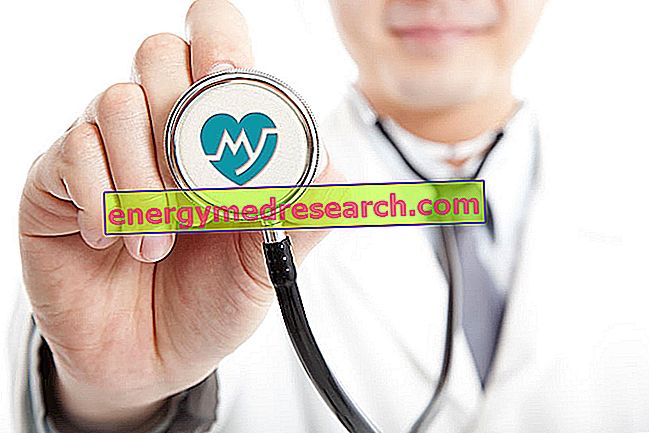Generality
An overdose occurs when an excessive amount of drugs or psychotropic substances (drugs or medicinal preparations) is taken. This phenomenon has serious toxic effects on the body and can be lethal.

What's this
The overdose is the consequence of the excessive intake of one or more narcotic or psychotropic substances, which are toxic to the body. This condition causes severe impairment of vital functions, often leading to the death of the subject.
What are drugs
Drugs are synthetic substances or of natural origin, which compromise the mental activity of those who use them and cause permanent physical damage to vital organs, such as the brain and heart.
Based on their effects, drugs can be grouped synthetically into three categories:
- Depressive drugs : they act on the central nervous system, depressing nerve impulses and slowing down the individual's brain functions. The opiates (such as opium, morphine, heroin and methadone) and barbiturates belong to this group.
- Stimulant drugs : they act as exciters on the central nervous system, producing euphoria, strengthening mental activities, decreasing the sense of fatigue and increasing muscle activity. The most widespread substances of this type are cocaine, amphetamines and derivatives (such as ecstasy) and GHB (gamma hydroxybutyric acid).
- Hallucinogenic drugs : they alter the transmission of nerve impulses, causing the distortion of reality and the temporary loss of the sense of reality and danger; this group includes natural substances (eg mescaline and hallucinogenic mushrooms) and synthesis (eg ketamine and LSD).
Other drugs are medicinal preparations containing narcotic or psychotropic substances, including those for human pharmaceutical or veterinary use, of current therapeutic use.
Causes
The reasons why you run into an overdose are mainly of 2 types:
- Accidental : the event occurs regardless of the will of the subject;
- Intentional : the person deliberately suffers an overdose due to the desire to experience the effects of the narcotic substance or for self-injurious intent (ie he wants to inflict harm or attempt suicide). In the latter case, the subject requires further attention in the treatment.
The severity of the overdose depends on many risk factors, but it is mainly related to:
- Degree of tolerance of the subject towards the narcotic or psychotropic substance;
- Taking a compound formulated with a higher and unexpected amount of active ingredient;
- Polydrug use that can amplify the toxicity of individual substances (eg heroin plus benzodiazepines or alcohol);
- Inexperience that can lead to "abuse";
- State of health of the subject (note: drugs are even more harmful if taken by people suffering from hypertension, heart disease, asthma or epilepsy);
- Transfer to a new route of administration (for example: from inhalation to intravenous injection);
- Resumption of drug use after a period of abstinence, such as following a detoxification therapy (in other words, when tolerance is lost and the overdose also occurs at the usual doses).
Overdose deaths tend to occur between experienced consumers and those with a greater level of dependency, rather than between young and inexperienced.
Symptoms and complications
Drug abuse involves an alteration of the perceptive and sensory faculties that can vary depending on the person, the type of substances taken and specific situations. The overdose can therefore present itself with a wide range of symptoms.
In the case of inhibiting substances (eg opiates), the symptoms of an overdose may include:
- Nausea and vomit;
- Irregular breathing;
- Drowsiness;
- Pale or cyanotic skin;
- Weak pulse;
- Dizziness and confusion;
- Slowness in reasoning, numbness and mental cloudiness;
- Great difficulty of memory and concentration with ease to distract;
- Incommunicability (confused language and difficulty in finding words).
If the overdose is induced by the excess of exciting substances (eg amphetamines and cocaine), instead, they can manifest:
- Psychomotor agitation (sense of general excitement with ostentatious security and good humor, inability to stand still, extreme sensitivity with respect to the surrounding environment, etc.);
- Nervousness;
- Hypertension;
- Tachycardia;
- Hyperthermia;
- Tremors or convulsions;
- Inclination to violence, arrogance and oppression.
These effects can occur even a few hours after intake.
Specific symptoms of overdose from more common drugs
OVERDOSE FROM HEROIN
In this case, a comatose or sub-comatose state occurs, with a severe depression of respiration up to respiratory arrest, associated with cyanosis and pupils considerably diminished in diameter (miosis).
Blood pressure can be greatly diminished, especially if the person is upright.
Heroin overdose can be anticipated by:
- Alternation of euphoric and depressive states, strong excitement and passivity;
- Sensations of heat, sweating and chills;
- Motor incoordination
- Cramps and muscle stiffness;
- Vomiting and abdominal pain.
The intake of this drug parenterally (ie by injection) considerably increases the risk of overdose, since the substance is rapidly absorbed and can block the brain centers of the breath, inducing death.
Smoking or heroin inhalation can also cause overdose, but the risk is significantly lower.
OVERDOSE DA COCAINA
In this case, the typical symptoms are:
- Tachycardia;
- Hypertension;
- Excessive sweating;
- Hyperthermia;
- Tremors;
- Headache;
- Dilated pupils.
With an excessive intake of cocaine you can also have:
- Strong anxiety, panic, aggression, insomnia and impaired judgment;
- Hallucinations, paranoia and manic behavior;
- Psychomotor agitation.
During the cocaine overdose, the irregularity of the beat can increase the risk of myocardial infarction or stroke. Other potentially lethal consequences are cardiovascular collapse, respiratory arrest and seizures.
The associated use of cocaine and alcohol produces a condensation product, cocaetylene, which has stimulating properties and can contribute to toxicity.
OVERDOSE DA ECSTASY
With the use of this heavy drug you risk irreversible brain injuries or severe cognitive deficits, even after the first intake.
One of the main risks of ecstasy overdose is heatstroke (or hyperthermia crisis), an excessive increase in body temperature due to the body's inability to regulate temperature. This effect can be immediate upon recruitment.
In case of an ecstasy overdose, the following can occur:
- Lack of sweating;
- Painful cramps in hands, back and arms;
- Dizziness, intense headache and vomiting;
- Sudden weakness and fatigue;
- Difficulty urinating and very dark colored urine;
- Ataxia (difficulty in walking);
- Irritability;
- Blurry vision and nystagmus (rhythmic oscillation of the eyeballs);
- Bruxism (uncontrolled teeth grinding) and trismus (persistent contraction of the masseters);
- Rhabdomyolosis (destruction of muscle masses);
- Disseminated intravascular coagulation;
- Severe renal failure.
These symptoms are often accompanied by some mental and behavioral disorders, represented by anxiety crises and personality alterations with acute psychotic episodes (hallucinations, delusions or mental confusion). Ecstasy overdose can be fatal due to fulminant hepatitis, acute respiratory failure or cardiovascular collapse.
Diagnosis
The use of drugs of different origins and nature (synthetic and non-synthetic) can be ascertained in the laboratory. The toxicological analysis can be carried out starting from biological samples (blood, urine and hair) or other materials (such as clothes and drinks).
The patient can be evaluated and monitored with other tests, such as chest X-ray, serial ECG and cardiac enzyme dosing.
Diagnostic criteria for overdose
- Recent intake of narcotic and psychotropic substances .
- Psychological or behavioral alterations : euphoria or flattening of affectivity, hypervigilance, susceptibility, anxiety, tension or anger, impaired judgment, etc.
- Two or more of the following signs or symptoms : tachycardia or bradycardia, mydriasis, hypertension or hypotension, sweating and chills, nausea or vomiting, psychomotor agitation or slowing down, muscle weakness, respiratory depression, chest pain, cardiac arrhythmias, confusion, seizures, dyskinesias, dystonia or coma.
Therapy
What to do
- To help someone overdosed, it is necessary to immediately call for help (118) and try to provide as much information as possible to the operators. The description of the symptoms and substances taken by the person (known or suspected) allows to focus the emergency intervention.
- In the meantime, the overdose must be assisted, as complications can quickly arise, such as respiratory arrest, hyperthermia, heart attacks or convulsions. For this reason, it is important to stay close to it, trying to keep it calm and awake (pinch the cheek, wet the face and wrists, talk and try to walk).
- If the subject loses consciousness and cannot wake up (giving a push in the chest and calling him by name) or there are symptoms such as cyanotic face, irregular breathing, incommunicability and weak pulse, it is necessary to place him in a lateral safety position to prevent him from suffocating with your own vomiting (frequent cause of death). This maneuver consists of laying the overdose on one side, with one leg outstretched and one bent, so that it cannot roll, and keep the airway free. If the person is not breathing, proceed to artificial respiration, while if it is believed that the heart has stopped, feel the pulse (with the three central fingers on the wrist) and proceed with a cardiac massage .
- If the subject is overheated, try to cool it by stripping it and waving it. Don't give anything to eat or drink.
- When a convulsion occurs, prevent the subject from harming himself; at the same time, make sure that the head is tilted back, so that the airways remain free.
Note
If the symptoms of overdose do not manifest themselves in a serious way, ie the individual responds, breathe and the heartbeat is present:- Keep the subject awake and do not leave him alone;
- Don't give food anyway;
- Do not try to induce vomiting.
Even in the event of recovery and lack of gravity, it is a good idea to call an ambulance or accompany the overdose to the nearest emergency room.
Once the ambulance has arrived:
- Tell health staff how the incident occurred and describe the symptoms;
- If the drug taken by the person is known or suspected, provide this information to rescuers to facilitate the intervention;
- If you are still in possession of the substance, give it to the paramedics so that they can analyze it and provide relief in the most appropriate way.
How to cure
Overdose treatment may vary depending on the substance that causes it.
- In the case of cocaine overdose, benzodiazepines (eg lorazepam) are used to inhibit most of the toxic effects, including excitation of the central nervous system and seizures, tachycardia and hypertension. Hypertension that does not respond to these medicines is treated with intravenous nitrates (eg nitroprusside) or phentolamine. Sometimes severely agitated patients must be pharmacologically paralyzed and mechanically ventilated to improve acidosis, rhabdomyolysis or multisystem dysfunction.
- Also for the ecstasy overdose the benzodiazepines represent the treatment of initial choice; these drugs help to inhibit the excitation of the central nervous system, convulsions, tachycardia and hypertension. Propofol (anesthetic) with mechanical ventilation may be necessary in severe agitation.
Depending on the severity of hypertension, if the patient does not respond to the benzodiazepines, he can be treated with nitrates (eg nitroprussiate) or other antihypertensives. Β-blockers (eg metoprolol) can be used for severe ventricular arrhythmias or tachycardia.
Hyperthermia can be life-threatening and must be treated aggressively with:
- Sedation plus evaporative cooling;
- Ice packs;
- Maintenance of intravascular volume and urinary flow with intravenous administration of physiological solution.
- The priority of the treatment of heroin overdose is to maintain airway patency and provide respiratory support. Patients with spontaneous respiration can be treated with a drug antagonist (generally, intravenous naloxone), which can rapidly reverse unconsciousness and apnea.
If respiratory depression occurs, endotracheal intubation is required.
Prognosis
In some cases, the overdose can be overcome with a full recovery; other times, permanent damage occurs to some vital organs, such as the liver, the brain, the heart and the kidney.
Overdose deaths generally occur shortly after taking the substances.



